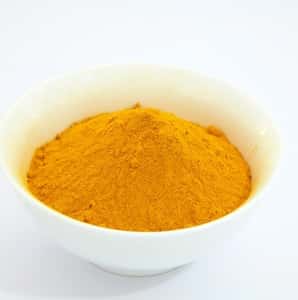
Pancreatic cancer is a challenging disease. The American Cancer Society puts one-year survival rates around 20%. Five-year survival is roughly 8%. That compares to five-year survival for prostate, thyroid, melanoma of the skin and breast cancer of 90% or greater. Is there anything that can be done to improve the odds for people diagnosed with pancreatic cancer?
Curcumin, A Natural Anticancer Substance:
Curcumin, a compound found in the yellow spice turmeric, has anti-inflammatory activity. Basic research suggests that curcumin may also have neuroprotective properties. People have been using both turmeric and its active ingredient curcumin to ease the pain of arthritis and other inflammatory conditions.
Now scientists at Baylor Scott & White Research Institute have found that curcumin may be able to overcome resistance to chemotherapy in certain cancer cells. The study found that small doses of curcumin could reverse chemical pathways by which pancreatic cancer cells develop resistance to gemcitabine, an important treatment for this aggressive cancer. As a result, the pancreatic cancer cells were more susceptible to this treatment.
Researcher Ajay Goel, PhD, suggested:
“Food-based botanicals have the potential to restore a healthier gene expression in patients but without the toxicity of certain drugs.”
Dr. Goel is a heavy hitter. He is not a fruits and nuts kind of guy. Dr. Goel is director of the Center for Gastrointestinal Research and of the Center for Translational Genomics and Oncology at the Baylor Scott & White Research Institute. He is professor of medicine at Baylor University Medical Center and is with the Charles A. Sammons Cancer Center of the Baylor Research Institute and the Sammons Cancer Center of the Baylor University Medical Center in Dallas, TX. You can listen to an interview we conducted with Dr. Goel at this link: Show 1079: What is the Science Behind Fabulous Foods for Health?
Stem Cells are Key Players in Cancer Recurrence:
There is growing evidence that cancer stem cells play an important roll in the evolution of resistance to chemotherapy. Stem cells can be though of as progenitor cells in that they serve as the origins or seeds of cancer cells. They can go dormant and escape toxic chemotherapy only to “awaken” later and create conditions for cancer cell survival. Dr. Goel’s most recent research was published in Carcinogenesis, July 27, 2017. Here is his perspective on this work:
“By treating certain cells with small doses of curcumin, we were able to reverse the pathways that lead to chemoresistance.”
Dr. Goel and his colleagues concluded:
“Overall, this study indicates clinical relevance for combining curcumin with chemotherapy to overcome chemoresistance in PDAC [pancreatic ductal adenocarcinoma].”
Not The First Time Curcumin Has Shown Anticancer Activity:
Colorectal Cancer:
Dr. Goel and his colleagues have demonstrated that curcumin potentiates the anticancer action of a chemo drug called 5-fluorouracil (5-FU) against colorectal cancer (BMC Cancer, April 10, 2015).
Breast Cancer:
An article in the Journal of Experimental and Clinical Cancer Research (July 19, 2017) suggests that curcumin can also play a helpful role against breast cancer:
“In breast cancer curcumin impedes tumor growth, malignant progression and spread.”
Prostate Cancer:
Prostate cancer may be vulnerable to curcumin. Research published in PLoS One (June 19, 2017) notes:
“Among nontoxic natural compounds, curcumin, the active ingredient in Curcuma longa, is known for its ability to target cancer cells and for its therapeutic and anti-invasive properties. Curcumin is a natural phenolic compound that has been studied for its anti-proliferative, anti-inflammatory, and anti-oxidative properties. The purpose of the present study was to investigate the effects of curcumin on highly metastatic human prostate cancer cells (PC3) and the mechanisms underlying its anticancer and anti-apoptotic properties.”
The researchers conclude:
“Curcumin acted as a potent cancer growth suppressive and cytotoxic agent in PC3, via the impairment of multiple signaling mechanisms, including chronic ER stress mediated pro-apoptotic pathways. Our dataset provide insight into targets and mechanistic strategies of the anti-cancer effect of curcumin and will serve as a useful resource for future studies.”
A Word of Caution:
Before one gets too excited about these new findings about curcumin against pancreatic cancer it is important to recognize that this work is mostly “in vitro.” That means it has been done in the test tube. Clinical trials must be completed before we can say with certainty that curcumin or turmeric can help in the fight against colorectal or pancreatic cancer.

